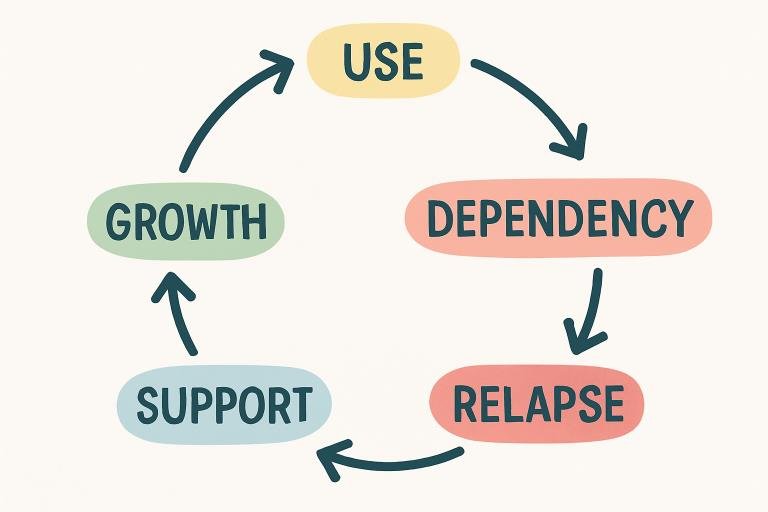Understanding the Cycle of Addiction
Addiction is not a singular event but a process that often follows a predictable and repetitive pattern. This “cycle of addiction” includes the stages of initial use, escalation to abuse, the development of dependency, and, frequently, relapse. Recognizing these stages forms the foundation for targeted interventions and successful recovery. Early recognition of these patterns empowers individuals, families, and professionals to take preventive and corrective action to effect change. For those seeking assistance, exploring rehab in Nashville provides both an understanding of addiction and extensive support options tailored to break the cycle. Many who struggle with substance use feel trapped in the loop of relapse and recovery, causing frustration and feelings of hopelessness. Breaking this cycle requires awareness not only from those directly affected but also from their loved ones and care providers.
Comprehensive Assessment and Personalized Treatment Plans
One of the cornerstones of successful rehab programs is a comprehensive assessment process. No two individuals will present with identical needs, histories, or underlying causes of addiction. Effective rehabilitation begins by evaluating the patient’s physical health, psychological status, and social environment. These detailed assessments inform the development of personalized treatment plans unique to each person, optimizing their chances for lasting recovery. Custom treatment plans adapt to evolving needs over time, improving engagement and positive outcomes.
This personalized approach addresses co-occurring medical or mental health conditions and considers factors such as trauma, environment, family dynamics, and personal goals.
Incorporating Evidence-Based Therapies
Successful rehab programs rely on evidence-based therapies to create meaningful, positive changes. Cognitive Behavioral Therapy (CBT) is among the most frequently utilized, helping individuals challenge and reframe negative thought patterns that fuel substance use. Various clinical studies have shown that CBT reduces relapse rates and supports sustainable recovery by equipping individuals with practical coping skills. Other therapies—such as Dialectical Behavior Therapy (DBT), motivational interviewing, and contingency management—are also critical components of effective treatment programs. The implementation of scientifically validated therapies ensures patients receive the best chance at long-term sobriety, reinforcing positive behavioral changes while addressing underlying emotional challenges.
Building a Strong Support Network
A strong support system significantly boosts the chances of a successful recovery. Engaging with support groups like Alcoholics Anonymous (AA) and Narcotics Anonymous (NA) enables individuals to share their experiences in a non-judgmental environment and encourages accountability. The collective advice and motivation from peers are crucial for maintaining focus during difficult times. Family therapy also plays a vital role, helping to mend strained relationships and equipping loved ones to offer steadfast support.
Developing Healthy Coping Mechanisms
Learning to manage stress, anxiety, and challenging emotions through healthy coping mechanisms is a cornerstone of sustained recovery. Mindfulness practices, meditation, and regular physical activity are invaluable skills that promote emotional regulation and stress resilience. Embracing new hobbies, engaging in creative outlets, or pursuing additional educational opportunities can fill the void left by substance use, giving life new meaning and focus.
Implementing Relapse Prevention Strategies
Relapse prevention is not merely about avoiding substances. It’s about equipping individuals with the skills and tools to anticipate and manage high-risk situations. Identifying personal triggers, rehearsing coping strategies, and developing a crisis management plan are critical components. According to Medical News Today, creating a structured relapse prevention plan can provide practical guidance for effectively managing these challenges. Involvement in ongoing therapy, seeking community support during vulnerable moments, and practicing honest self-reflection give individuals the confidence to interrupt the cycle of relapse.
Addressing Co-Occurring Disorders
Many individuals with substance use disorders also experience co-occurring mental health challenges such as depression, anxiety, or post-traumatic stress disorder (PTSD). Integrated treatment models that address both addiction and mental health ensure the root causes are not neglected and reduce relapse rates. Treating these issues together, instead of separately, leads to greater overall well-being and fewer instances of substance use as a maladaptive coping method.
Committing to Aftercare and Continuous Monitoring
Aftercare is a critical phase of the recovery journey, often underestimated in its importance. Ongoing support through outpatient counseling, alumni programs, and sober living homes provides continued accountability and growth opportunities. Regular monitoring, with the flexibility to adjust the treatment plan as life circumstances change, is essential for long-term success. Over time, aftercare solidifies healthy routines and connections that anchor sobriety amid everyday stresses and temptations.
Breaking the cycle of addiction demands a holistic, evidence-based approach focused on the individual. With comprehensive assessment, personalized therapy, strong support, robust coping strategies, and integrated mental health care, individuals can move beyond relapse into a future defined by hope and lasting change.



